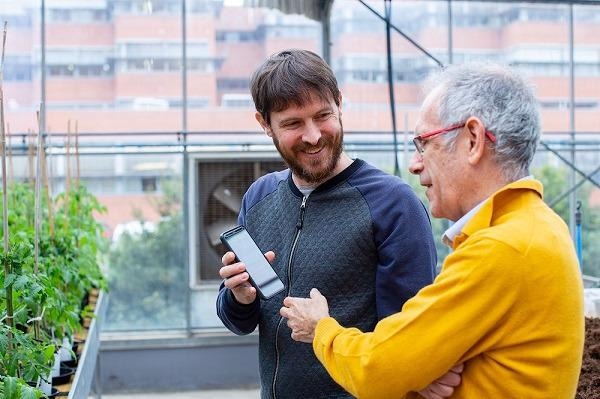Doctor X Nabat is the name of an application developed by members of the Plant Phenomics research group at the UB and Agrotecnio (CERCA center affiliated with the University of Lleida), in collaboration with the International Center for Biosaline Agriculture (ICBA) in Dubai (United Arab Emirates), for early diagnosis of diseases and insects in horticultural crops.
 The experts Shawn Carlisle Kefauver and Josep Lluís Araus, members of the research group on Plant Phenomics from the UB and Agrotecnio. Image Credit: Universitat de Barcelona.
The experts Shawn Carlisle Kefauver and Josep Lluís Araus, members of the research group on Plant Phenomics from the UB and Agrotecnio. Image Credit: Universitat de Barcelona.
This program, designed for farmers and agriculture specialists, is available on Android devices as well as desktops. The program utilizes an ODK Collect form to scan how much the plant is impacted and delivers an efficient answer with the treatment it requires through an image submitted by the user.
In Egypt, Tunis and the United Arab Emirates, Doctor X Nabat has been examined in tomato, pepper and cucumber crops, and it is presently being modified for use in additional Mediterranean crops.
Artificial Intelligence for Improving Crop Performance
Annual crop losses owing to biotic stress, including diseases and pests, vary between 20% and 40%, according to the Food and Agriculture Organization of the United Nations (FAO). Droughts, salinity and nutritional deficits are examples of abiotic stressors that can harm crops. The country’s lifestyle, the national economy and food security are all harmed as a result of these effects.
As a consequence, Doctor X Nabat, which is the outcome of a two-year collaborative research study, has focused on delivering an advanced reaction to avoid crop loss and reduce the need for phytosanitary intense applications.
Artificial intelligence offers many possibilities in agriculture, and one of these is the creation of applications like this one, which we offer to the farmers in order to help them deal with the losses.
Josep Lluís Araus, Principal Researcher and Professor, Department of Evolutionary Biology, Ecology and Environmental Sciences, Universitat de Barcelona
Araus is a principal researcher of the research team on Plant Phenomics.
Deep learning technology is used in this project to improve the speed and efficiency of the mechanisms that create the application.
Deep learning allows us to accelerate the functioning of the application so that the farmer receives a quick response after uploading the image of the disease, it takes ten seconds.
Shawn Carlisle Kefauver, Member, Plant Phenomics, Universitat de Barcelona
Doctor X Nabat’s algorithm — and its webpage format, DoctorXUB.com — was created using more than 25,000 images of various diseases, abiotic stressors and nutritional deficiencies that were provided by the project’s research personnel and colleagues.
The farmer takes a photo of a damaged plant from the crops with the use of Doctor X Nabat. The app gives an accurate diagnosis, providing a percentage of chance and displaying the disease or pest affected and how to treat it. The phytosanitary treatment proposed as a remedy is one of the EU-approved treatments.
Doctor X Nabat is now accessible in English, with a new edition in the works that will also feature French and Arabic. The most recent version, which is now in beta version, will give a method for removing pests using environmentally friendly fertilizers.
The research teams of the UB, Agrotecnio, and ICBA will arrange training events aimed at farmers about this application in 2022 to distribute knowledge about the application among the public and emerging countries of the Mediterranean area.